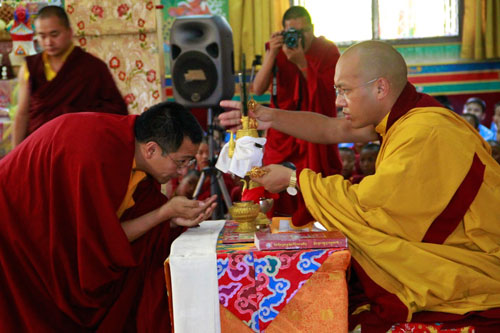March 13, 2011 – Vajra Vidya Institute, Sarnath
 An audience of 600 devotees crowded into the main shrine room at Vajra Vidya Institute to receive the 1000-armed 1000-eyed Chenrezig empowerment from Gyalwang Karmapa.
An audience of 600 devotees crowded into the main shrine room at Vajra Vidya Institute to receive the 1000-armed 1000-eyed Chenrezig empowerment from Gyalwang Karmapa.
The empowerment was broadcast worldwide by live webcast over the Internet and there were more than 4,000 ‘hits’. [It’s not possible to estimate the actual numbers watching the webcast as many of these ‘hits’ would have been from dharma centres where students of His Holiness had gathered together to watch.] Students of the Gyalwang Karmapa from 42 different countries filled the hall, including two groups of students from local schools and a senior delegation from the All India Buddhist Organization. His Holiness taught in Tibetan, while translators provided translation into 8 languages: English, Hindi, German, French, Spanish, Polish, Chinese and Vietnamese.
Gyalwang Karmapa was assisted by his senior tutor Khenchen Yongzin Thrangu Rinpoche, Dzoghen Ponlop Rinpoche, Bogangkar Rinpoche and Gyatso Rinpoche. The Rinpoches represented the assembly during the initiation.
Of the many extant traditions of the Chenrezig practice, His Holiness chose to use the one begun by Bhikshuni Srimati, known in Tibetan as Gelongma Palmo, an ordained Buddhist nun who founded the Avalokitesvara “Nyun-gne” tradition. Bhikshuni Srimati was born into a royal family in India but wanted to become ordained and practice the Dharma, so she refused to get married, left her family and became a Bhikshuni. Then she contracted leprosy, a feared disease in those days, so the religious community expelled her and she became an outcaste, forced to live in the forest. The great Mahasiddha Indrabodhi came across her and instructed her in devotion to Avalokitesvara. Through meditation and prayer, her leprosy disappeared and she was entirely cured. Subsequently, she attained enlightenment and gained many followers.
In addition to conferring the empowerment, Gyalwang Karmapa gave a short teaching. Having previously discussed the nature of genuine happiness and reasons for developing kind-heartedness, during his four-day teaching on how to become a good person by bringing benefit to beings, Gyalwang Karmapa now explored the profound philosophy which underpins the Middle Way School of Tibetan Buddhism–the concepts of dependent origination and emptiness.
He explained how important it is to understand that all conditioned phenomena are mere appearances, dependent on and inseparable from each other. Because of our confused perception, we mistake these appearances for reality; we grasp at the idea of an independently existing self and fail to see our own interconnectedness. It’s similar to when we watch a film and become involved with the characters, developing attachment to some and aversion to others, forgetting that it is only a film.
Because of this root ignorance, we are beset by the three poisons and the afflictions. Dharma practice is the antidote to these.
Our failure to understand our interdependence leads to problems at all levels. For example, individuals drop litter in the street, and countries fail to consider the effect of their actions on neighbouring countries.
Our self-clinging locks us into a box of I, me and mine, which excludes most people and leads to a narrow perspective on the world.
The true aim of Dharma practice is to be able to see things as they are and that means ultimately understanding profound emptiness. He emphasized that this was not a mere intellectual understanding of emptiness as an abstract philosophical position, a topic to be studied and debated, but applying the view of emptiness to everyday life, as the key to seeing things as they really are.
His Holiness concluded by describing how, since he was a child and was first recognized as the Karmapa, he has felt himself propelled by the force of karma. He expressed his deep love and affection for everyone and his aspiration that all beings should be happy.
“There are so many natural disasters,” he said, perhaps reflecting on the terrible earthquake and tsunami which had struck Japan during the teachings. “We do not know what the future holds, but we shouldn’t worry. It is my heartfelt wish that all of you are able to find happiness.”
His Holiness took this opportunity to express his deep gratitude to his teacher, Khenchen Yongzin Thrangu Rinpoche, the organizers of the teachings, the two translators and all those who had gathered from all over the world. He said, “I feel such a strong sense of gratitude that I feel that I should thank the earth and sky as well.”
[We hope to provide a full translation of Gyalwang Karmapa’s teaching on appearances, dependent arising and emptiness in due course.]


